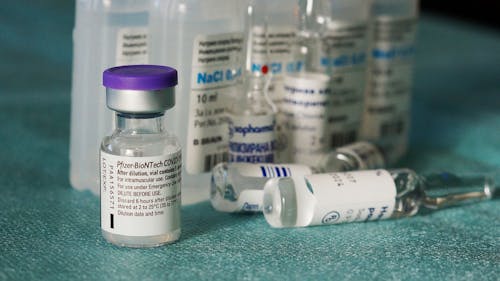Rutgers officials discuss U. plans for fall 2021 at briefing

Rutgers Biomedical and Health Sciences Chancellor Brian L. Strom held a coronavirus disease (COVID-19) briefing today to provide updates on safety measures the University will implement for the Fall 2021 semester in light of the recent announcement that all Rutgers students must be vaccinated to return to campus.
Rutgers currently has three COVID-19 vaccination sites that have been approved by the state but do not yet have vaccines, Strom said. Information regarding the availability of vaccines from Rutgers and potential exemptions will be sent out later this week, but the University encourages individuals to get vaccinated as soon as they are eligible.
“The best vaccine is the one you can get first,” Strom said. “Do not wait for Rutgers to be able to vaccinate you."
Executive Vice President for Academic Affairs Prabhas V. Moghe discussed the University’s developing plan for the Rutgers community to move back to campus. The Daily Targum previously reported some courses will continue to be offered remotely in the fall, especially those with large sections, but Moghe said the specifics will vary between Rutgers’ three campuses, he said.
At Rutgers—New Brunswick, approximately 75 percent of course sections will have a face-to-face component, with 25 percent remaining fully online, Moghe said. Before the pandemic, only approximately 10 percent of course sections were fully virtual.
Information regarding housing applications for the Fall 2021 semester will be released in the first two weeks of April, Moghe said. Continuing students will be able to request specific types of rooms, residence halls and roommates as in the past, and incoming students will be able to request roommates and types of rooms. Housing assignments will take place in June and early July.
“Especially full-time students who plan to register, who will be vaccinated and who are not in fully online programs are really encouraged to avail of the housing accommodations on the campus,” Moghe said.
The University plans to continue offering doubles and four-person apartments, he said. A smaller section of the residence halls might be reserved for isolating in the event that a student contracts COVID-19, and students will be expected to adhere to all of the University’s health and safety protocols, including social distancing.
Classrooms will be assigned 33 to 50 percent of their normal capacity depending on the size and configuration of each individual room, Moghe said. Student study spaces will also operate at reduced capacity to enable social distancing.
Strom said these measures are important because while the vaccines have proven to be effective in preventing death, hospitalizations and infections from COVID-19, they are not 100 percent effective, and vaccinated individuals can still test positive.
Guidelines from the state will determine future regulations and whether the University is able to host events in the fall, Moghe said. In the meantime, he encourages students to make use of workshops and networking opportunities offered by career centers.
“Together, the faculty, staff and the students are going to be a part of this vibrant fall semester experience,” Moghe said.
Globally, the U.S. is not at the highest risk level in regards to COVID-19, with Brazil, Chile and several European countries occupying that spot, Strom said. But New Jersey is one of several states at high risk for active or imminent outbreak. The state has approximately 4,484 new cases per day, which is worse compared to the past two weeks.
While New Jersey is one of several states that are considered high risk for COVID-19 outbreaks, Rutgers itself has been able to maintain a low percent of positive tests, Strom said. But with the country entering its fourth surge of the virus, numbers have been increasing both statewide and within Rutgers.
From March 21 to 27, Rutgers conducted approximately 11,000 tests, and 147 came back positive for a total positivity rate of 1.39 percent, the Targum reported. The University has typically remained below 1.0 percent.
The surge is attributed to the increased presence of variant strains, premature relaxation of public health measures and spring break travel, Strom said. In New Brunswick itself, 80 cases have been traced to individuals who went to Florida over spring break.
“We are now well underway in what was expected to be the fourth surge of this disease nationwide,” Strom said. “Hopefully, if things go well, it’ll be the last surge.”
Strom said he predicts the fourth surge will carry through April and much of May and hopes that vaccination efforts will prevent future surges.



